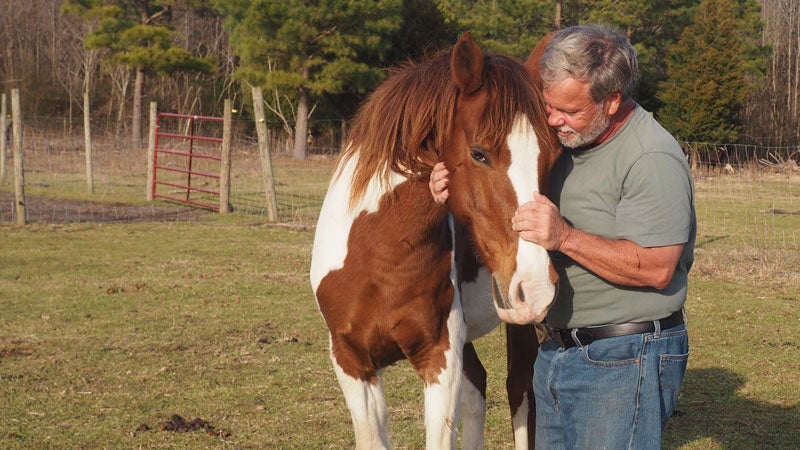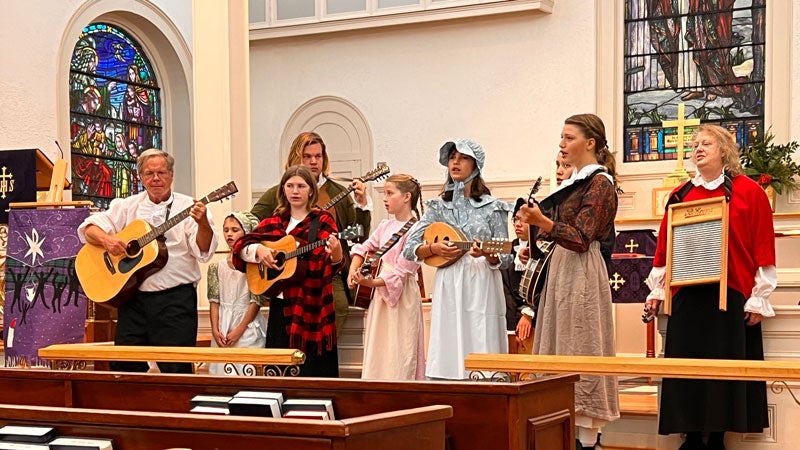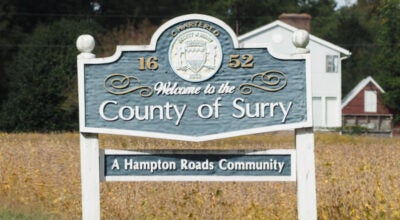‘That horse … he understands:’ Prosecutor named ‘Citizen of the Year’ for trauma-informed horsemanship
Published 4:00 pm Wednesday, January 4, 2023
In his 20-plus years of prosecuting molestation cases, Isle of Wight County Deputy Commonwealth’s Attorney Steve Edwards has come to recognize the importance of body language.
Edwards, who was recently named Smithfield’s 2022 “Citizen of the Year,” now approaches victims the same way he would a terrified horse on his farm.
“An adult human is a predator, and I don’t mean that pejoratively, I mean it as a literal statement of fact; we are predators,” Edwards said. “Our eyes are on the front of our faces; when we see something we want, we walk in a straight line to get it … and we make eye contact.”
Horses and other large herd animals, by comparison, have their eyes on the side of their heads and will amble rather than walk straight to take advantage of their peripheral vision. When a horse chooses to make eye contact with a human, according to Edwards, it’s because one is threatening the other or there’s some type of stressful situation.
“A horse responds to precisely the same body language that a traumatized adult does, or a traumatized child,” Edwards said. “One of the hardest things to teach a horse is to get in that closed-in trailer, and the horse doesn’t want you reaching toward his jugular vein, … does not want you making eye contact, … does not want to hear feet coming up behind him.”
Sixteen years ago, Edwards adopted his first Corolla mustangs, an endangered breed that’s lived wild in North Carolina’s Outer Banks since the 16th century, when Spanish colonists brought them over from Europe nearly 100 years before English settlers founded Jamestown. According to Currituck, North Carolina’s tourism website, there were only 100 horses left in the Corolla herd as of 2014. He also now has some Choctaws, another endangered breed estimated to number only 300 to 450 worldwide. Choctaw horses, Edwards said, are descended from the “Trail of Tears.” The term refers to the United States government’s forced march of the Choctaw tribe from their Mississippi homeland to Oklahoma in the 1830s, which killed thousands of Choctaw people along the way.
“Most of the Corollas that we have here either had a health problem that required them to be captured … and removed from the wild, or they had some kind of behavioral situation that made them have to be removed,” Edwards said.
But for the past 12 of those years, he and a group of volunteers – many in their teens and twenties – have been taking what’s now known as the Mill Swamp Indian Horses preservation program in a new, human-focused direction that uses horsemanship to teach caregivers how to recognize and respond to trauma victims, and help the victims themselves rebuild their lives.
Since 1970, Smithfield’s Rotary and Ruritan clubs have jointly recognized an outstanding Smithfield citizen each year. Past recipients include former Mayor Carter Williams, former Smithfield Foods Chairman Joseph W. Luter III, Smithfield Times Publisher Emeritus John B. Edwards and the late Segar “Sig” Cofer Dashiell, author of “Smithfield: A Pictorial History.”
“This is really, really gratifying, because I understand what it really is, and what it really is, is recognition for what this program does,” Edwards said.
People diagnosed with post-traumatic stress disorder, or PTSD, “very often have no understanding of why they feel the way they now feel,” but “that horse does, he understands,” Edwards said.
According to the American Psychiatric Association, PTSD symptoms can include nightmares or flashbacks, reckless or self-destructive behavior, feeling detached or estranged, and being easily startled by a loud noise or accidental touch. The condition was called “shell shock” after World War I and “combat fatigue” after World War II, but isn’t exclusive to combat veterans, and can occur as a result of a person living through a natural disaster, war, rape, historical trauma, domestic violence or bullying.
PTSD affects approximately 3.5% of U.S. adults every year, according to the American Psychiatric Association. The lifetime prevalence of PTSD in adolescents ages 13-18 is more than double, at 8%.
“So many people don’t trust anybody, and a significant number of people have got no reason to trust anybody; there hasn’t been anybody in their life that’s been trustworthy,” Edwards said. “But to come out and work with the horse, and then to see that the horse is responding to them because the horse trusts them … that is a huge deal for a lot of people. … It doesn’t matter how good your counselor is, your group, your program, if you don’t trust them, it can’t work.”
The Mill Swamp program also now includes a music component, where children and adults meet on Tuesday nights to learn to play guitars, fiddles, dulcimers and other bluegrass instruments, as a confidence-building exercise. The group now goes by the name “Pasture #3,” and plays paid and unpaid gigs across Hampton Roads, any money from which goes toward funding the Mill Swamp program. Horses, Edwards explained, eat roughly 14,000 pounds of hay per week, costing Mill Swamp roughly $60,000 per year to feed the ones living on the farm.
Pasture #3 recently performed a Christmas concert at Christ Episcopal Church in December after most of Smithfield’s “Colonial Christmas” activities planned for the weekend of Dec. 3-4 were canceled due to weather.
“It was just a wonderful show,” said Mary Cole, who runs the church’s Sundays at Four classical music program and is another past recipient of the “Citizen of the Year” award.
“Some of the more experienced kids really are at a professional level,” Edwards said.
The Mill Swamp program isn’t just for trauma victims. Edwards also works with first responders and other people likely to encounter trauma victims, to help them better understand PTSD. When Lydia Johnson, now 27, was 11 years old, her parents got her one month of riding lessons with Edwards as a birthday present. She’s been volunteering with him ever since, and is now chairwoman of Gwaltney Family Farm Inc., the nonprofit breed conservation corporation that administers Mill Swamp Indian Horses. Johnson and Edwards’ paralegal, Terry O’Boyle, each recently wrote letters supporting Edwards’ nomination for the Citizen of the Year award.
The farm itself is steeped in local history, dating to 1635 when the original Gwaltney family came to Isle of Wight County. Edwards’ family has owned the land for five generations.
It’s not quite a working colonial farm. There’s no smokehouse or cabin. But the breed of sheep on the farm are descendants of those that would have been found on a 17th century farm near the Blackwater River, which at the time marked the edge of the British Empire.
Edwards uses no artificial fertilizers, no pesticides and no herbicides, preferring to rely on centuries-old techniques of using worms, manure and beetles to keep the ground fertile.
“We teach kids quite young. … I have 7-year-olds out here who understand that for a pasture to function wonderfully you need to have a bacteria-to-fungus ratio of about one-to-one,” Edwards said. “And in the woods, the bacteria-to fungus ratio is generally about one-to-1,000. … If we are going to have pasture where there was woods, we have to bring in bacteria. And a lot of people would think that a 7-year-old can’t learn that, but they can.”
His volunteers also teach children how to shear sheep and turn the wool into yarn.
“In the office, you learn the impacts of trauma,” Edwards said. “You watch it build up until it just about crushes people, and out here you watch people blossom, and that is something that we need more of. … The kids learn a little about stone-age technology and history.”
Edwards will be honored with a catered dinner at The Smithfield Center on March 1 at 6 p.m. The Citizen of the Year Committee is to meet Jan. 4 to set a cost for tickets and locations where they can be purchased.









